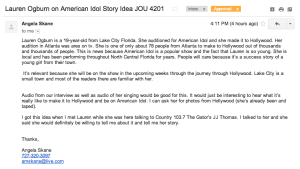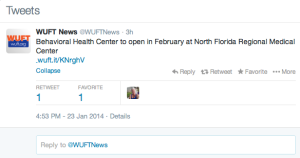It was an especially crazy day in the INC today because of the developments in the Tiffany Sessions case. As we worked on our coverage at WUFT, it was unbelievable to simultaneously see the CNN coverage on the overhead televisions.
Erica’s editing student, Andrew Kays, had a large role in the coverage of the Sessions case. He wrote the story after attending the press conference. When Logan first arrived for the day, Andrew was putting the finishing touches on the article. Logan edited the story, followed by Erica.
Once the story was complete, I sent out a tweet. I liked seeing people re-tweeting the breaking news about the case.
I received your email about the hyperlink and AP style issues in the Sessions story. Updated screenshots are below
I worked on some research for Mark Leeps to see if I could find more details about the 1994 kidnapping Paul Rowles was involved in. In this particular incident, the girl was able to escape. Unfortunately, I could not find any more details apart from the same few facts that every publication was discussing. This was likely because the kidnapping and sexual assault victim was a minor.
Story pitches are still arriving at a sluggish pace. In addition, students are continuing to pitch stories that are missing an appropriate angle. For example, one student submitted a story about how the Levy County School District is preparing to build a new middle/high school. While this is interesting, Erica had to inform him about an even more newsworthy angle. The school is planning on building the school on an existing cemetery plot. How did she figure this out? By looking at the school board meeting minutes. Sometimes, these students want to finish to move onto the next story without allowing their current story to live up to its potential. Erica and I both emailed him at different times, so I am hoping to see an updated version on WUFT.org soon.
Another student has been working on a story about a local author who has gotten a book published through Penguin Books. This story had such potential, but instead of focusing on the author, the reporter was focusing on a book reading the author took part in on Feb. 1. When I looked through the email chain, I saw how multiple editors have tried to work with her on this. Yesterday, there was an email from Dr. Lewis and Danielle. Also, Erica contacted her earlier this morning.
When I received her edited version this afternoon, I was disappointed with the results because it still placed an emphasis on an event that occurred last week. As a web platform, we cannot be posting articles for events that occurred last Saturday. In this fast-paced world, a story can go stale in a few hours. I have included her copy, in addition to the email I sent her.
Local author Joe Haldeman gives reading of new book
Email sent to Ana on 2/6 with follow-up questions
Gainesville based author Joe Haldeman has released his latest book, a thriller loosely inspired by his own experiences as a soldier in the Vietnam War.
“Work Done For Hire”, made in collaboration with the Penguin Group, is a tale of a war veteran turned struggling author whose past comes to haunt him when mysterious enemies threaten him with a fate worse than death if he does not kill for them.
A critically acclaimed author and recipient of the Damon Knight Memorial Grand Master Award, Haldeman usually speaks in front of large crowds of faithful followers, but on Feb.1, he spoke to a room of about 30 people at Wild Iris Bookstore and Civic Media Center.
Haldeman authored more than 30 books, “The Forever War” and “Forever Peace” being some of his most well-known. His books have won numerous awards, including the Hugo, Nebula and the Italian “Futuro Remoto” Award, according to his biography.
As an American man, and by extension an American boy, he was always fascinated by weapons, he says. He even brought a visual aid to the reading at Wild Iris.
The aid is a small target into which he shot a couple of rounds, for practice. Approving murmurs trickled through the crowd. Some of the audience members are themselves veterans and instantly connected to Haldeman’s tale.
A man from the back of the room commended his abilities, talked of his own aim and the battle in which he “really learned to fire.”
Haldeman spoke of pacifism and being involuntarily drafted to Vietnam. As a young boy, he was unable to throw ball, which later turned into his inability to throw a grenade.
He tells the story of throwing a grenade in the trenches and watching it fly straight up.
John Then, a local artist, is entranced by this recollection. Then, who “lucked out of the draft” because of high blood pressure, says these stories resonate with his generation.
After Haldeman read an excerpt from “Work Done for Hire,” he opened the conversation to questions.
The audience was curious about war, politics and writing.
Zot Lynn Szurgot, member of the Gainesville Coalition for Peace, came to the reading because she was interested in hearing his view on war.
“It was really great to hear about his transformation from soldier to pacifist,” she said.
Haldeman’s wife, Gay, occasionally reminds him to direct the conversation back to the book.
“Writers can sometimes be difficult people,” she says with a loving smile.
It takes him a year or so to finish a book, he says.
“When I start, I haven’t got an idea in my head, but I’ve got a fountain pen and the will to destroy blank paper.”
For many attendees hearing Haldeman talk personally about his relationship with some of the biggest names in science fiction was a great experience.
“Hearing him talk about Isaac Asimov and other ‘Masters’, that was really neat,” says Keith E. McInnis, a local aikido instructor.
“You know, there are places Joe Haldeman can give readings where the lines would be so long you could never get in,” he says. “So we are really privileged here.”
Gay, who has been married to Haldeman for 48 years and seen all of the pleasures and challenges of being married to an author, says that he immediately accepted the invitation to speak locally.
Haldeman moved to Florida in order to care for his ailing mother and split time between here and Cambridge, Mass., where for decades, he taught science fiction writing at MIT.
He and Gay chose to move inland to Gainesville to be “equal distance from both coasts,” Haldeman says.
Gainesville for him is the place where he bikes to a coffee shop each morning to handwrite new lines for his next book.
As “Work Done for Hire” appears set out for mixed reviews from readers, Haldeman is happy to make time to share it with Gainesville locals.
When asked why he accepts to speak at such a small venue in town he says that Gainesville is now home, and so he says “Why should I refuse?”
Today, Dr. Lewis stopped in the INC on several occasions. He continues to provide us with helpful clarifications. Today, he informed us that start-ups unique to Gainesville should be looked at differently from stories about new businesses, namely restaurants and stores. Overall, I think we have all been doing a great job of spotting the difference, but I was glad he addressed this directly.
I received another story pitch today about a two-year-old girl who drowned in a septic tank in Fruitland Park yesterday. I was a little wary about this idea because while this is a tragedy, how does this impact reach beyond her family and friends? I advised her to do some pre-reporting about how common this is in North Central Florida, as well as ways to prevent this type of accident. She said she wants to pursue this story from the code enforcement angle. I look forward to seeing what this story blossoms into.
After our discussion in class last night, I started using the Tasks function in Gmail. One student’s story has been published, but we want to include a better audio clip. As you mentioned, tasks can be linked to emails pertaining to the particular subject matter. Editors working tomorrow will be aware that this task needs to be completed. In addition, I added another task for a story about juvenile sentencing that Matt mentioned has localization potential. By maintaining this task bar, I think we can eliminate lulls during the various shifts.
Throughout today’s shift, Logan was helpful with various projects. He completed this week’s In the News. His story selection was much better this week. I only replaced one article because I thought the Lockheed Martin story was more important for our readership.
Logan also completed the initial edits on a submitted story that was received at the start of our shift. Upon looking at the email chain, it was evident that this student was having some issues finding what was newsworthy about the inclusion program at Newberry Elementary. He has been emailing back and forth with editors for the past eight days. This program has been in place for seven years, but he was encouraged to focus on how technology has impacted the program and how families have been moving into the area, so their children can attend the school.
Logan read it, made some notes and told me that the story was still missing the point. As I read it, I felt as if there were many pieces missing. In one part of his story, he explains what a “Big Mac” is, but he failed to explain what other terms meant. As someone not affiliated with special education, I have no idea what a slant board is. I am guessing many of our readers would be curious about what these are.
In addition, while I have not seen anything that resembles “patchwriting,” I am worried about students relying on email and other impersonal communication instead of meeting with sources face to face. In the following story, red flags went up in my head because one of his quotes was followed by “Hickox said in an email.” While I appreciate the honesty, I emailed him about getting audio, but he said he did not have any. How is this possible if he interviewed several sources?
Also, his story is from Newberry Elementary, a school not too far from the University of Florida campus. He submitted a photo provided by someone else, which leads me to believe he did not travel to the school. While this is not the end of the world, I am concerned about how much effort went into this story.
Newberry Elementary’s Inclusion Program Attracts Parents
Email sent to Keith on 2/6 with follow-up questions
Pam Hickox’s son is a third-grade student who is in his first year at Newberry Elementary School. Prior to this school year, she spent a year and a half trying to get him enrolled in Newberry for one reason: the school’s inclusive education model.
Hickox’s son has Down syndrome, but as part of Newberry’s inclusion model, all of the school’s special-needs students take classes with non-disabled students, instead of being put into separate special-education programs, or what is known as the pull-out model.
According to principal Lacy Redd, students in kindergarten through fourth grade are served in a co-teach model. The special-education teachers push into the regular education classroom and provide support and accommodations.
“I was aware of the inclusion program, and had checked on my son attending about a year and a half ago,” Hickox said in an email. “At the time, I was told from the District Office it was not likely any students from outside of Alachua County would receive McKay scholarships to attend from another county.”
McKay scholarships offer parents of special-needs students the choice of transferring the student to another school.
“Ultimately, I was able to get a job in Newberry, which allowed my son to come to school with me and attend Newberry Elementary School,” she said.
Hickox’s child is just one example. Students come from all over Gainesville, or in Hickox’s case, move to the area to for the inclusion program.
”We have had families move to Newberry for the inclusion model for sure,” said Redd. “But, you have to live in our zone to go to our school. So it does require a family to move to our zone.”
Redd founded the inclusion model at Newberry seven years ago. Through the work of the school’s three special-education teachers and the use of assistive technology, the inclusion model is constantly changing and improving to best fit the needs of its students.
“Every year I take into consideration our budget and our school improvement plans to try and provide those extra tools that students need,” said Redd. “We’re always looking for new things, things that we can incorporate into our education plan that help meet those kids needs.”
The school recently started using iPads with some of its special-needs students, but the assistive technology can range from something as simple as a special grip on a pencil, to a slant board, to a device called a Big Mac. The Big Mac is two buttons, one red and one green, that can be set to say anything the teacher or student may want.
“When I was first told that I would be working with this I was like, ‘The only Big Mac I know comes from McDonald’s and I have no clue what you’re talking about,’” said first-grade teacher Morgan Martin.
Martin has a quadriplegic student in her class, and the Big Mac, along with the iPad help to give the student a voice.
“It gives him a voice since he can’t communicate,” said Martin. “This way he can speak out like the other kids do. He does like having a voice.”
Having the special-needs students in the classroom full-time is a good thing for those students without disabilities too.
“It is good though because then all the other kids don’t see him as just this person who floats in our room and leaves,” said Martin. “They see him as their friend.”
Regardless of the impact of the technology, the true measure of success of any model is test scores. In Florida, all students, whether they have a disability or not, are expected to pass the FCAT. Except FCAT is getting phased out for Common Core… or whatever ends up replacing it. According to Redd, Newberry has seen a remarkable change in their data since the inception of its inclusion model.
“We are always looking at data to try and drive our instruction,” she said. “We’ve had a lot of success with kids being able to pass the state assessment and show remarked improvement in achievement scores since we’ve started the co-teach model.”
Redd believes a big part of the success is that the special-needs students are exposed to on-grade level material with the inclusion model.
“Before, in the pull-out model, they were not receiving the on-grade level instruction. They were going to a smaller group setting, but you saw the skill level drop,” she said.
Hickox has been very pleased with the progress of her son under the inclusion model.
“I have seen a change in my child,” she said. “He has always loved school, but as the curriculum was getting harder, he was frustrated. I feel with the inclusion program and assistive technology, he is able to be as successful as he can.”
Editor Comments: Only one parent makes this seem anecdotal. Nothing changed to prompt the story; this is just a nice feel-good fluff piece. If we do run it, we’ll need some more tags and probably a better headline.
On another story, Logan demonstrated his attention to detail. The story involved an arrest pertaining to the production and sale of methamphetamines. The arrests took place in the same household, but Logan was concerned because the ages did not seem to match up. As Dr. Rodgers has pointed out, we should always do the math. I told Logan to see what he could find, and he was able to locate their ages from the Levy County Sheriff’s Office. Even though the ages ended up being correct, I applauded Logan for thinking critically during the editing process. After the Ruby Sheppard story, I am also trying to pay particular attention to numbers and statistics.
However, this story illustrated a wider problem I have noticed. Erica’s students had performed initial edits on this methamphetamine arrest story. This included one of her students contacting the reporter about coming in to answer various questions.
After speaking with the reporter, the story was ready. I began to check it over, but Matt told me to spike the story because the arrests had taken place last Friday without any changes occurring since then. I wrongly assumed that we were moving forward with the story based on the work that went into this story all morning.
To address this problem, I think at the beginning of each morning shift or the end of the afternoon shifts, we need to go through and spike the stories that are no longer timely. If there is a way to update them, the reporter should be contacted about doing this immediately. In addition, the stories should no longer be labeled in the WordPress as “Ready for First Edit,” “Ready for Second Edit” or “Ready to Publish.” They should be marked as “Reporter Questions.” This should eliminate a lot of wasted effort on stories that we are no longer able to publish.
Monitoring these stories will be even more essential after the weekend because, as Jesse has mentioned in class, a lot of stories go untouched from Friday to Monday. We could set up a system where we check the WordPress on Sundays at 5 p.m. for what is no longer publishable, as well as contact reporters about issues they need to address. While I do not want to bother reporters constantly, this effort may allow them to answer any questions in a timely manner as a new story cycle begins.
As another suggestion, I think content creators should also have to submit excerpts for their stories. These excerpts are the small blurbs that appear below their headlines on the main WUFT website. I think this will force them to figure out the central point of their story, something we must all continue to work on.
In preparation for the 6 p.m. news show, I had the opportunity to work a little more behind the scenes. Andrew discussed the Sessions story, and Dana Edwards discussed her story about concussion research being pursued in our area. As fellow journalists and not telecommunication students, they were nervous. I encouraged them and told them how accommodating Steven and Lauren had been to me during the past few weeks. I gave them some tips for working on their scripts and also practiced some lines with Dana. I love seeing the continued collaboration between our various entities during each and every shift.
Links to Work
Record Exonerations Reported in 2013; Only One In Florida
This short brief was written by one of the web producers earlier this week. I am still confused about why this article was not published several days ago, especially because it is not excessively long. While this article is newsworthy, I also wish she had contacted more sources. Cheydrick Britt could have been an incredible source for this article. Could we do a follow-up article on him? What is it like to be an exonerated man? How did the Florida judicial system fail him? I felt it was important to publish the article today, while considering potential future articles, because the report was released this week. The writer had not linked to the report released by the National Register of Exonerations, so I added a hyperlink, in addition to a hyperlink to the Innocence Project of Florida website. While web stories can provide the main points, we need to enable our readers who want to know more about a particular topic. Tripp and I discussed linking this story to the description of allegations. However, they were sexually graphic and very detailed. In addition, the focus of this story is on his exoneration, not what he was falsely accused of.
Girl, 11, Gives Love To Orphans One Pair Of Shoes At A Time
This story is from Fleming Island, which is a little outside of WUFT’s coverage, so I was skeptical at first. However, I discussed this story with Dr. Lewis. He said he had talked to Megan about how she must focus on the young girl orchestrating this project and not on the collection of shoes. The story was well done and included many descriptive quotes. I removed a small section that included a quote from her swim coach. I felt like it was just added in to provide unnecessary padding that reiterated points already made by several other sources. In addition, I moved a couple of paragraphs around to try to keep various blocks of quotes together. It can be confusing when speakers switch after each paragraph. This is a story that Chris is interested in discussing on WUFT’s 6 p.m. show tomorrow, so I contacted Megan about seeing whether she is interested. I think giving students exposure to various platforms is one of the highlights of the INC.













